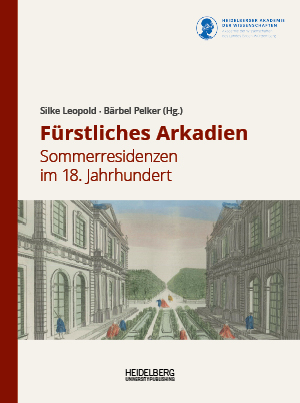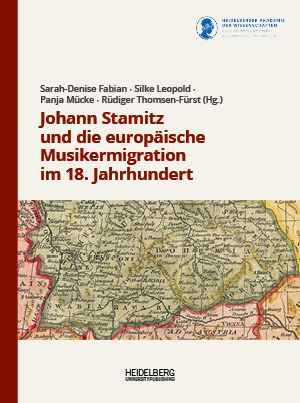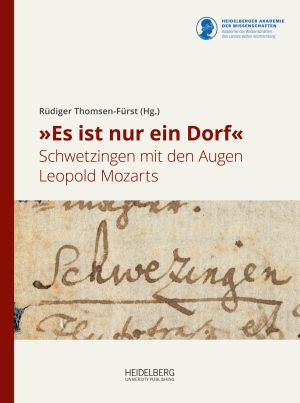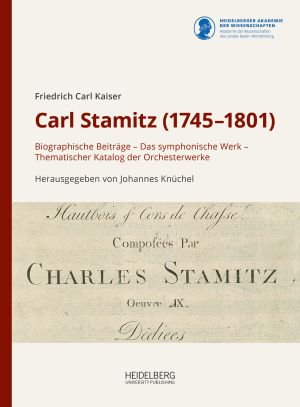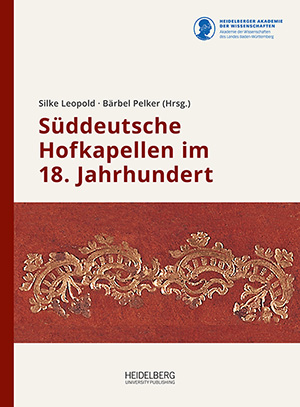Schriften zur Südwestdeutschen Hofmusik
Schriften zur Südwestdeutschen Hofmusik (Writings on South-West German Court Music) are an Open Access publication series edited by the “Südwestdeutsche Hofmusik” research centre of the Heidelberg Academy of Sciences and Humanities. It primarily publishes the results of the research centre in the form of monographs, conference reports and annotated source editions.
When processing the history of music at the courts of the nobility and rulers of south-west Germany in the eighteenth century, the research has included not only the historical aspects of music and culture, but also social history and economic aspects. Other focal points for research include a comparison of historical institutional issues in a pan-European context, stylistically critical investigations into the practice of composition, studies into the role played by court music in the developmental history of the modern orchestra, taking particular account of innovations in instrument manufacture in the eighteenth century, as well as questions about historical performance practice. The results are published as monographs and conference reports, as well as in form of annotated source-editions.
Published so far
Fürstliches Arkadien: Sommerresidenzen im 18. Jahrhundert
In academic research, princely summer residences are regarded as places of longing, where rulers sought to realize their dream of an earthly paradise and escape the constraints of courtly ceremonial. Traditionally, this research has been based in history of art. What music was made in the summer residences, and how it might have differed from that of the main residence, has not yet been systematically studied. The conference made a contribution to this by examining the musical life at selected European summer residences of the eighteenth century and relating it to one another. The individual contributions present the respective situations of the cultivation of music at selected summer residences in the German-speaking countries as well as in Italy, Spain, England, Sweden and Russia.
Johann Stamitz und die europäische Musikermigration im 18. Jahrhundert
This publication documents the papers presented at the symposium "The Stamitz family and European musician migration in the 18th century", which took place in Schwetzingen on 17 and 18 June 2017 on the occasion of the 300th birthday of Johann Stamitz. The conference was organised by the Research Centre for the History of Southwest German Court Music of the Heidelberg Academy of Sciences and the Mannheim State University of Music and Performing Arts.
Johann Stamitz, a figurehead of Mannheim’s court music, and his family are exemplary for the musician migration of the eighteenth century in Central Europe. Based on this, the papers will examine various aspects of the topic. It was part of the conference’s concept to offer not only experienced experts in this field but also young scholars a platform for their own research and for the presentation of the results.
»Es ist nur ein Dorf« : Schwetzingen mit den Augen Leopold Mozarts. Begleitpublikation zur Ausstellung im Karl-Wörn-Haus, Museum der Stadt Schwetzingen, vom 28. April – 28. Juli 2019 aus Anlass des 300. Geburtstages des Komponisten
This volume, which accompanies the exhibition of the same name, honours Leopold Mozart (1719-1787), who was not only a musician, composer and teacher, but also a well-informed observer of his time. His letters contain numerous details on music and cultural-historical themes, and his notes on his stay in the summer residence of Schwetzingen in the Palatinate are invaluable. The authors investigate this information and relate it to the knowledge of their respective disciplines. The result is a comprehensive picture of the Electoral Palatinate summer residence of 1763, a music-historical focal point in the third quarter of the eighteenth century.
Carl Stamitz (1745–1801): Biographische Beiträge – Das symphonische Werk – Thematischer Katalog der Orchesterwerke
Carl Stamitz (1745-1801), Johann Stamitz's eldest son, is well known for his works, as his compositions can be found on numerous recordings and concert programmes in today's music scene. Musicologists though do not pay the same attention to this composer, who came from the ranks of the court musicians of the Electoral Palatinate. The dissertation by Friedrich Carl Kaiser (1931-2008), submitted in 1962, is still the only monograph that systematically deals with his life and his orchestral music, which was a major part of his creative work. It is a standard work that rightly appears in every bibliography on the subject. Up to now it has only been possible to view the compulsory typescript copies of the dissertation, which are distributed among a few libraries and which differ in detail from one another. The reason for this is the somewhat unusual genesis of the text, as Kaiser repeatedly made changes and additions to his Stamitz monograph over a long period of time. The present edition, which also includes Kaiser's personal copy from his estate, now provides musicology researchers with a reliable edition of this fundamental text.
Süddeutsche Hofkapellen im 18. Jahrhundert: Eine Bestandsaufnahme
Since the Middle Ages, next to churches the courts have been the most important employers for professional musicians. The important role of court music in European and particularly German music history has not been reflected in the efforts made by musicological scholarship in the past. Although there are numerous studies on particular courts, comparative studies are still lacking.
This publication documents the current state of research on the most important court chapels, as well as selected smaller aristocratic chapels in southern Germany during the eighteenth century.


